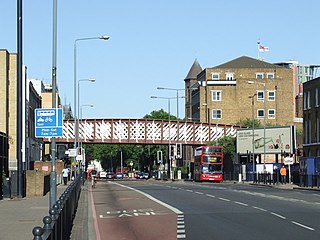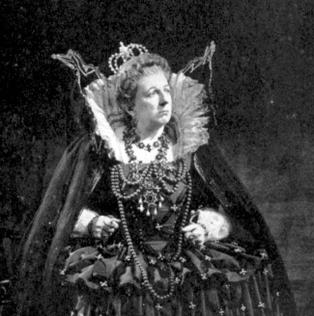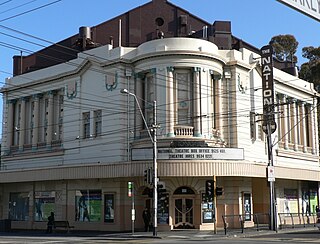Related Research Articles
The Guildhall School of Music and Drama is a conservatoire and drama school located in the City of London, United Kingdom. Established in 1880, the school offers undergraduate and postgraduate training in all aspects of classical music and jazz along with drama and production arts. The school has students from over seventy countries. It was ranked the number one U.K. conservatoire in the 2021 Guardian league tables for music and as the sixth university in the world for performing arts in the 2020 QS World University Rankings.

Sir Georg Solti, was a Hungarian-born British orchestral and operatic conductor, best known for his appearances with opera companies in Munich, Frankfurt and London, and as a long-serving music director of the Chicago Symphony Orchestra. Born in Budapest, he studied there with Béla Bartók, Leó Weiner and Ernő Dohnányi. In the 1930s, he was a répétiteur at the Hungarian State Opera and worked at the Salzburg Festival for Arturo Toscanini. His career was interrupted by the rise of the Nazis' influence on Hungarian politics and, being of Jewish background, he fled the increasingly harsh Hungarian anti-Jewish laws in 1938. After conducting a season of Russian ballet in London at the Royal Opera House he found refuge in Switzerland, where he remained during the Second World War. Prohibited from conducting there, he earned a living as a pianist.

English National Opera (ENO) is an opera company based in London, resident at the London Coliseum in St Martin's Lane. It is one of the two principal opera companies in London, along with The Royal Opera, Covent Garden. ENO's productions are sung in English.

The Royal Opera House (ROH) is an opera house and major performing arts venue in Covent Garden, central London. The large building is often referred to as simply Covent Garden, after a previous use of the site. It is the home of The Royal Opera, The Royal Ballet, and the Orchestra of the Royal Opera House. The first theatre on the site, the Theatre Royal (1732), served primarily as a playhouse for the first hundred years of its history. In 1734, the first ballet was presented. A year later, the first season of operas, by George Frideric Handel, began. Many of his operas and oratorios were specifically written for Covent Garden and had their premieres there.

Dame Joan Alston Sutherland, was an Australian dramatic coloratura soprano noted for her contribution to the renaissance of the bel canto repertoire from the late 1950s through to the 1980s.

Dame Kiri Jeanette Claire Te Kanawa is a New Zealand opera singer. She had a full lyric soprano voice, which has been described as "mellow yet vibrant, warm, ample and unforced". Te Kanawa had three top 40 albums in Australia in the mid-1980s.

Sir Geraint Llewellyn Evans was a Welsh bass-baritone noted for operatic roles including Figaro in Le nozze di Figaro, Papageno in Die Zauberflöte, and the title role in Wozzeck. Evans was especially acclaimed for his performances in the title role of Verdi's Falstaff. He sang more than 70 different roles in a career that lasted from his first appearance at Covent Garden in 1948 to his farewell there in 1984.

Commercial Road is a street in the London Borough of Tower Hamlets in the East End of London. It is 1.9 miles (3.1 km) long, running from Gardiner's Corner, through Stepney to the junction with Burdett Road in Limehouse at which point the route splits into the East India Dock Road and the West India Dock Road. It is an artery connecting the historic City of London with the more recently developed financial district at Canary Wharf, and part of the A13.
Sir John Michael Pritchard, was an English conductor. He was known for his interpretations of Mozart operas and for his support of contemporary music.

The Royal Ballet School is a British school of classical ballet training founded in 1926 by the Anglo-Irish ballerina and choreographer Ninette de Valois. The school's aim is to train and educate outstanding classical ballet dancers for the Royal Ballet and the Birmingham Royal Ballet.

The Royal Opera is a British opera company based in central London, resident at the Royal Opera House, Covent Garden. Along with the English National Opera, it is one of the two principal opera companies in London. Founded in 1946 as the Covent Garden Opera Company, the company had that title until 1968. It brought a long annual season and consistent management to a house that had previously hosted short seasons under a series of impresarios. Since its inception, it has shared the Royal Opera House with the dance company now known as The Royal Ballet.
Joan Carlyle is an English opera singer. She was born in Upton on the Wirral, Cheshire. After auditioning for the Royal Opera House, Covent Garden, London, she was put under contract by the musical director Rafael Kubelík and made her debut in 1955, appearing also under him in The Magic Flute in 1956.

Joan Cross was an English soprano, closely associated with the operas of Benjamin Britten. She also sang in the Italian and German operatic repertoires. She later became a musical administrator, taking on the direction of the Sadler's Wells Opera Company.

Sir Edward Thomas ("Ted") Downes, CBE was an English conductor, specialising in opera.

Bath College is a Further Education college in the centre of Bath, Somerset and in Westfield, Somerset, England. It was formed in April 2015 by the merger of City of Bath College and Norton Radstock College. The College also offers Higher Education courses and has its own Undergraduate building.

The National Theatre is a 783-seat Australian theatre and theatrical arts school located in the Melbourne bayside suburb of St Kilda, on the corner of Barkly and Carlisle Streets. The building was constructed in 1921 as The Victory Theatre, rebuilt as 2550 seat cinema in 1928, finally converted to a live venue 1972/4 with 783 seats.

Inia Morehu Tauhia Watene Iarahi Waihurihia Te Wiata was a New Zealand Māori bass-baritone opera singer, film actor, whakairo (carver) and artist.
Joan Carden AO OBE is an Australian operatic soprano. She has been described as "a worthy successor to Dame Nellie Melba and Dame Joan Sutherland" and was sometimes known as "the other Joan" or "The People's Diva". She was a Principal Soprano with Opera Australia for 32 years, and was particularly associated with the title roles of Giacomo Puccini's Tosca and Madama Butterfly. However, she sang over 50 other roles, from the 18th century, including virtually all the Mozart heroines, through to works by contemporary composers.
Rae Woodland was a British soprano who studied with Roy Henderson. Her debut was as Queen of the Night at Sadlers Wells. She sang in many European festivals, and debuted at Covent Garden in La sonnambula with Joan Sutherland and Luciano Pavarotti. She was first asked to sing for Benjamin Britten on the English Opera Group's tour of Russia, and played many roles for him subsequently. She also created roles for Gottfried von Einem, Nicholas Maw and Sir Arthur Bliss, and made many live broadcasts for the BBC, from the RAH Proms to Friday Night is Music Night. She retired from the opera stage in 1984. She then taught singing at the Royal Academy of Music in London, and at the Britten-Pears School in Snape Maltings on the invitation of Sir Peter Pears.

Troxy is a Grade II-listed Art Deco music venue on Commercial Road in Stepney, London. Built as a cinema in 1933, it closed in 1960 and became a training school for the London Opera Centre. In the 1980s the building was used as a bingo hall, and the Troxy was converted to a live events space in 2006. The building is considered a vital part of East London's history and was Grade II listed in 1990. It has a capacity of 3,100.